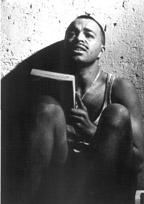






| Allah
Tantou (God's Will)
The life of Marof Achkar, David's father, can be seen as emblematic of much recent African history. In 1958, his countryman, Sekou Touri declared Guinea the first independent French African colony and became a hero of Pan-Africanism. Marof Achkar, a leading figure in the Ballets Africains, served as U.N. ambassador for the new government. In 1968, Achkar was suddenly recalled, charged with treason and vanished into the notorious Camp Boiro prison. His family was exiled and, only after Touri's death in 1984, did they learn of his execution in 1971. David Achkar writes, "I knew my father was a hero, but I wanted to know what that meant." The Marof Achkar we first encounter in home movies and newsreels is a charismatic, confident performer on the world stage. The Marof Achkar glimpsed later through letters and a remarkable prison diary is a man bereft of position, identity and family; he is now simply "Number 54." But in prison, he undergoes an almost religious conversion. "It's strange," he wrote, "I've never felt so humble, insignificant and yet it is the deepest reason of my happiness: I believe it's the grace of God." In a cinematic
tradition which has privileged the calm collective voice of the griot,
Allah Tantou speaks with the fragmented, uncertain rhythms of
the individual conscience. Achkar juxtaposes diverse, sometimes contradictory
texts - documentary, newsreel, dramatizations, photos, journals - to
deny us a single, authoritative narrative space. Allah Tantou
argues through its example that vigorous debate, candor and self-criticism
are the pre-conditions for Africa's political and spiritual renewal.
|
"Wrenching as
well as cathartic, it required a special kind of courage to make this
film." "Better than
any African film before it, Allah
Tantou
brilliantly redefines the documentary genre." "Makes intense
links between personal and public history...A powerful tool for reassessing
the recent African past."
Video
Purchase: $195
|
 Allah
Tantou is
the first African film to confront the immense personal and political
costs of the widespread human rights abuses on the continent. It follows
filmmaker David Achkar's search for his father, his father's search
for himself inside a Guinean prison and Africa's search for a new beginning
amid the disillusionment of the post-independence era. One of the most
courageous and controversial films of recent years, Allah Tantou
speaks in an unabashedly personal voice not often heard in African cinema.
Allah
Tantou is
the first African film to confront the immense personal and political
costs of the widespread human rights abuses on the continent. It follows
filmmaker David Achkar's search for his father, his father's search
for himself inside a Guinean prison and Africa's search for a new beginning
amid the disillusionment of the post-independence era. One of the most
courageous and controversial films of recent years, Allah Tantou
speaks in an unabashedly personal voice not often heard in African cinema.